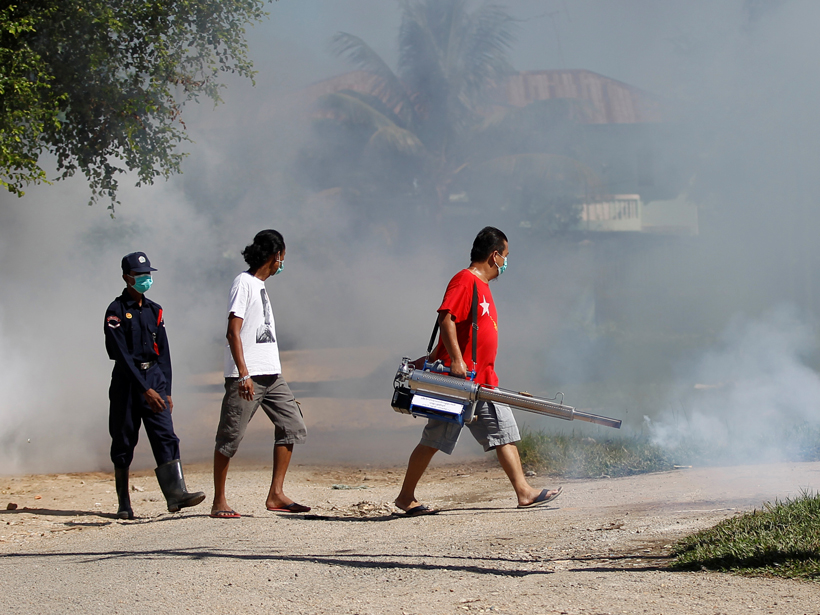A long-planned summit on climate change and health that was abruptly canceled last month by the Centers for Disease Control and Prevention (CDC) got a second chance at life in Atlanta yesterday. Detached from the federal agency and cut to a third of its originally intended length, the resurrected conference likely earned much more attention than it otherwise would have.
The renamed Climate and Health Meeting took place a few kilometers from the CDC at the Carter Center, a nonprofit organization founded by former president Jimmy Carter, thanks to a rescue mission by former vice president Al Gore, who was scheduled to be one of the original meeting’s keynote speakers.
The CDC canceled the original conference just as President Donald Trump’s new administration—known to be hostile to the idea that human activity is causing climate change—took office. When the decision became public, Gore mobilized the nonprofit he founded, the Climate Reality Project, along with a slate of other climate-concerned organizations.
“I got a call from the vice president, who asked what we could do to get this back on track,” Georges C. Benjamin, the executive director of the American Public Health Association (APHA) and an organizer of the original meeting, told Eos in an interview as things got started Thursday. “[Gore] said he had already talked to President Carter, and he would find the money, and in 15 minutes we had a decision. And now we’ve got 340 people here, more than 700 wanted to come, there are thousands of people on the livestream, and look at the excitement in this room.”
Pathogens Without Borders
The revived 1-day meeting retained the basic objective of the 3-day original—to examine ways in which altered climatic conditions impinge on human health or are expected to do so—but not the original’s broad slate of abstracts about specific effects of climate change on pathogens, chronic health conditions, public safety, and food.

Giving an overview, Ashish Jha, director of the Harvard Global Health Institute in Cambridge, Mass., one of the new meeting’s sponsors, said that “as the world warms, and as hot places get hotter and dry places get drier, we will see more droughts, we will see more famines, the nutritional content of foods will change, and children and families that are thriving now will face hunger, will face malnutrition, will face diseases.”
“Here’s the catch,” he added, in a glance at politics that was rare for the day and a line that brought loud applause, “Walls will not keep these pathogens out.”
Neglected Consequences of the Climate Crisis
Gore remarked early in the day that “with all the work that has been done on the climate crisis, and solutions to the climate crisis, many would argue that too little attention has been paid by many to the health consequences of the climate crisis, and we hope to help remedy that today.”
Protecting vulnerable groups is a core public health concern that speakers addressed.
Protecting vulnerable groups is a core public health concern that speakers addressed. “Disproportionately, children and the elderly and the underserved, particularly in minority communities, are less climate resilient,” Benjamin said in remarks to the meeting audience. “The uneven burden of climate change is, by definition, climate injustice.”
In a rapid succession of presentations later, speakers and panelists reviewed familiar observations and predictions of climate scientists through the less familiar lens of likely health impacts. Presenters discussed rising temperatures that encourage mosquito-borne diseases such as Zika, greater flooding that increases the dispersal of waterborne pathogens such as cholera, plant diseases that attenuate the nutrients in major crops, and extreme weather events that destabilize societies.
More Meetings to Follow
Because the original 3-day meeting was collapsed into 1 day, additional meetings are planned. The Harvard Global Health Institute will hold a Symposium on Climate Change and Public Health on 27 April. Benjamin said that APHA’s annual meeting, which will bring 12,000 attendees to Atlanta in November, may host some of the canceled sessions as well.
Although two CDC scientists appeared at the meeting on Thursday, one speaking on a panel and one introducing a keynote address, it’s unclear if federal scientists will come to the future gatherings, said Jonathan Patz, director of the Global Health Institute of the University of Wisconsin–Madison.
He and others at the meeting seemed to be preparing for a reality in which government-funded climate research is muted for now, but they didn’t seem daunted by it. “Even if, at an international level, things stall out, even if things at the federal level stall out, there is so much innovation and progress happening at local levels,” he noted in an informal midday press conference. What’s more, “the private sector is moving forward to a healthy low-carbon society.”
—Maryn McKenna (email: [email protected]; @marynmck), Freelance Journalist
Citation:
McKenna, M. (2017), Revived climate change forum focuses on threats to human health, Eos, 98, https://doi.org/10.1029/2017EO068177. Published on 17 February 2017.
Text © 2017. The authors. CC BY-NC-ND 3.0
Except where otherwise noted, images are subject to copyright. Any reuse without express permission from the copyright owner is prohibited.

